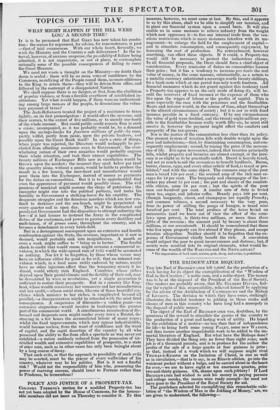POLICY AND JUSTICE OF A PROPERTY-TAX. COLONEL ToanENs's motion for
a modified Property-tax has not yet been adopted by the House of Commons, for the honour- able members did not meet on Thursday to consider it. To this measure, however, we must come at last. By this, and it appetto to us by this alone, shall we be able to simplify our taxation, and to place our financial system upon a sound basis. It will also enable us in some measure to relieve industry from the weight which now oppresses it—to free our internal trade from the vex- atious restrictions which in many instances interfere with its ma- nagement—to enlarge the field for the employment of capital— and to stimulate consumption, and consequently enjoyment, by lessening the cost of production. No retrenchment, however searching, can effect these objects. if it could, a Property-tax would still be necessary to protect the industrious classes. In all financial proposals, the DEBT should form a chief object of consideration. Every remission of duties on commodities lessens their price ; but it has a tendency to increase pro tanto the real value of money, in the same manner, substantially, as a return to a metallic currency substituted a sovereign worth twenty shillings, for a bank-note which at one period. was only worth fourteen. All financial measures which do not guard against this tendency (and. a Property-tax appears to us the only mode of doing it), will be- nefit the receivers of fixed incomes at the expense of those who live upon the wages of labour or the profits of capital. This is more especially the case with the pensioner and the fundholder. Rents and interest would, in the course of time, adapt themselves to the altered circumstances of society; but it is not so with fixed. incomes payable in a fixed currency. If by any circumstances the value of gold. were doubled, and the twenty-eight millions pay- able to the fundholder became really worth fifty-six, lie must still receive it, however the payment might affect the comforts and prosperity of the tax-payers.
Nor is the justice of the commutation less clear than its policy. Our present system of taxation falls with double weight upon the poor and industrious,—first, by diminishing consumption, and con- sequently employment ; second, by raising the price of the necessa- ries of life. It is upon necessaries, indeed, that taxation principally falls, whilst property and luxuries are almost exempt, or the pres- sure is so slight as to be practically unfelt. Bread is heavily taxed, and not so much to aid the revenue as to benefit landlords. Bacon, butter, cheese, eggs, and every other article of food, is taxed or pro- hibited,* and with the same object. The common soap of the poor man is taxed 120 per cent. ; the scented soap of the rich man es- capes for 10 per cent. The burgundy and champagne of the law- maker pay about 15 per cent.; the port and sherry of the comfort- able citizen, some 30 per cent. ; but the spirits of the poor man one hundred per cent. A similar rate of duty is levied upon tea, sugar, and inferior coffee. Brandy pays 500 per cent. (though burgundy, claret, and champagne are equally French); and common tobacco, a second necessary to the very poor, from its power of stilling the pangs of hunger, is taxed. nine hundred per cent. The total produce of the taxes levied on necessaries (and we leave out of view' the effect of the corn- laws upon prices), is thirty-two millions, or more than three .fifths of the revenue; the amount paid by luxury is about three millions, or one seventeenth. It should be remembered that those who live upon property can live abroad if they please, and escape taxation altogether. Neither should it be forgotten that the ex- penses of Government chiefly benefit the rich. A convulsion would Subject the poor to great inconvenience and distress; but, if society were resolved into its original elements, what would be- come of the wealth of the BARINGS and the NEWCASTLES? * The importation of beef, lamb, mutton, pork, sheep, and swine, is prohibited.



























 Previous page
Previous page